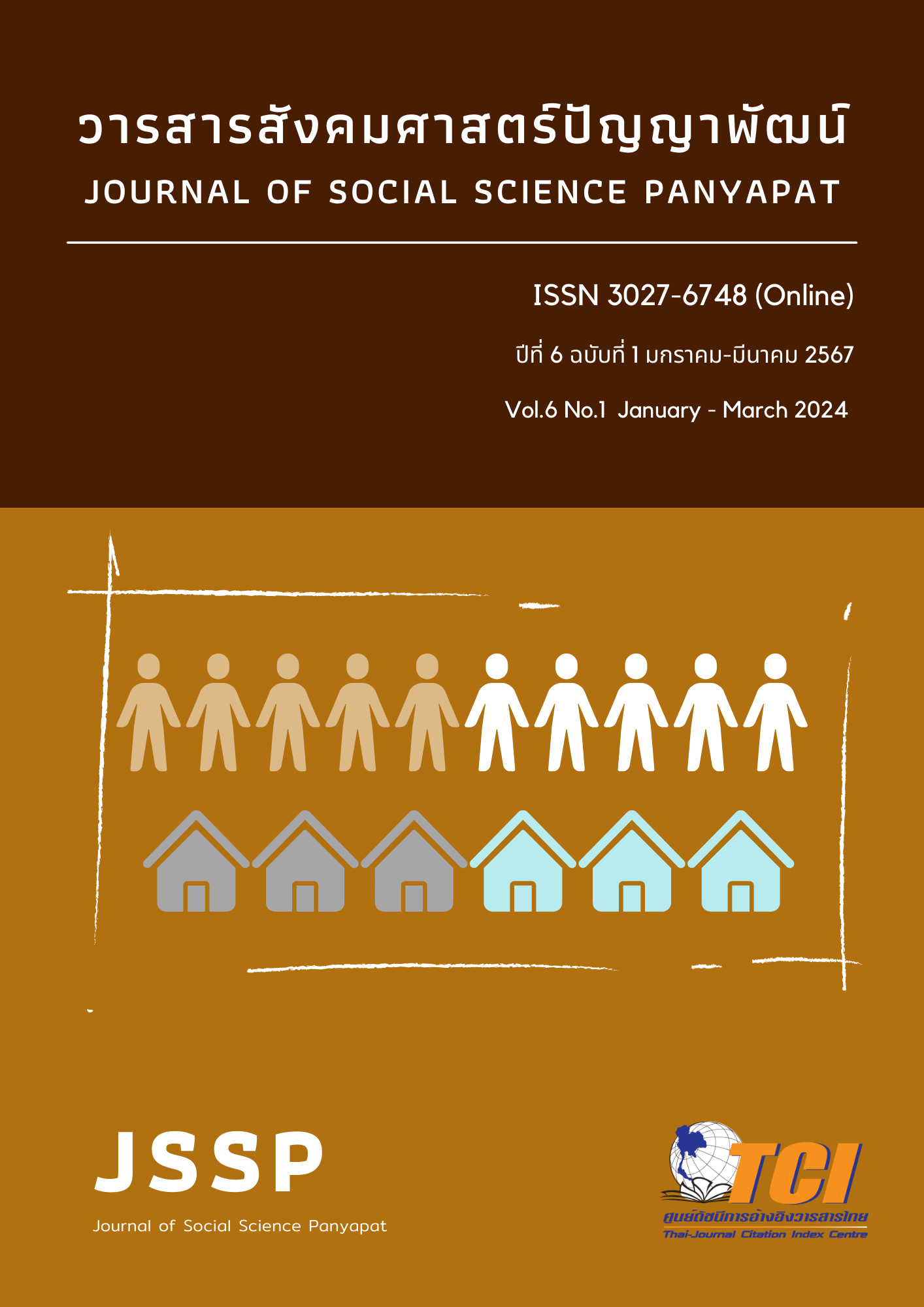The Buddhist Threefold Wisdom Pedagogical Method for Deaf Students
คำสำคัญ:
Buddhist Threefold Wisdoms, Deaf Student, Pedagogy Methodบทคัดย่อ
This article aimed (1) to study the theories about teaching deaf students in a classroom in pedagogy sciences; (2) to study the Buddhist threefold wisdom pedagogy method in Theravāda Buddhism; and (3) to propose the Buddhist threefold wisdom pedagogical method for deaf students. This is qualitative research work. The research methodology has been established, using resources and instruments for data collection and analysis from primary and secondary sources, in-depth interviews with key informants using interview questions selected through purposive sampling, the use of technological tools, etc. Descriptive analysis was used to examine the data. The study found a correlation between instructors' beliefs, classroom practices, and perceived outcomes, shaping pedagogical practices. It was emphasized that every child should receive at least one year of quality pre-primary education to foster lifelong learning and ensure inclusive and equitable education. Pre-primary education was found to enhance early cognitive abilities such as reading and math skills. The teaching and learning process was depicted as interactive and communicative, aiming to elicit visible reactions from students to demonstrate learning. Teachers' positive attitudes towards training and students were highlighted. To support participatory pedagogy and develop indicators across various learning domains, three effective tactics and strategies were identified. The integration of sustainability into the evaluation framework was emphasized as an opportunity to advance the Buddhist Threefold Wisdom Pedagogical Method for Deaf Students. This innovative approach combines Buddhist educational principles to address the unique needs of deaf students, emphasizing three components: listening (Sutamaya-pañña), wisdom (Cintā-maya-paññā), and development (Bhāvanāmayā-pañña). In conclusion, this research sheds light on the potential of the Buddhist threefold wisdom pedagogy method in catering to the educational needs of deaf students. Keywords: Buddhist threefold wisdoms, Deaf student, Pedagogy Method.
เอกสารอ้างอิง
Amina, O., Ladhani, S., Findlater, E., & McKay, V. (2017). Curriculum Framework for Enabling the Sustainable Development Goals. London: Commonwealth Secretariat.
Bhikkhu P.A. Payutto (Somdet Phra Buddhaghosachariya). (2019). Buddhadhamma. (4th Ed.). Bangkok: Sahadhammika Co., Ltd.
Chu, S. K. W., Reynolds, R. B., Tavares, N. J., Notari, M., & Lee, C. W. Y. (2021). 21st century skills development through inquiry-based learning from theory to practice. New York: Springer.
Daniels, H. (2008). Vygotsky and research. New York: Routledge.
Edwards, L., & Crocker, S. (2007). Psychological processes in deaf children with complex needs: An evidence-based practical guide. Philadelphia: Jessica Kingsley Publishers.
Eron, L. (2014). Educating teachers of the deaf: Experiences and perspectives from teachers on facilitating academic and social participation in Uganda. (Degree of Doctor of Philosophy, University of Oslo)
Glenn, S. (2007). The development of theory of mind in deaf people. (Degree of Doctor of Philosophy, University of Sheffield).
Groome, D. (2013). An introduction to cognitive psychology: Processes and disorders. New York: Psychology Press.
Jenkins, J. M., & Astington, J. W. (2000). Theory of mind and social behavior: Causal models tested in a longitudinal study. Merrill-Palmer Quarterly, 46(2), 203-220.
Langford, P. E. (2004). Vygotsky's developmental and educational psychology. New York: Psychology Press
Marschark, M., & Hauser, P. C. (2012). How deaf children learn: What parents and teachers need to know. New York: Oxford University Press, Inc.
Marschark, M., & Spencer, P. E. (2010). The Oxford handbook of deaf studies, language, and education, vol. 2. New York: Oxford University Press.
Marschark, M., Edwards, L., Peterson, C., Crowe, K., & Walton, D. (2019). Understanding theory of mind in deaf and hearing college students. The Journal of Deaf Studies and Deaf Education, 24(2), 104-118.
Mathews, E. S. (2017). Language, power, and resistance: Mainstreaming deaf education. Washington, D.C.: Gallaudet University Press.
Newman, F., & Holzman, L. (2013). Lev Vygotsky (classic edition): Revolutionary scientist. New York: Psychology Press.
Peters, K. A., Beer, J., Pisoni, D., & Remmell, E. (2021). Theory of mind acquisition in children who are deaf: The importance of early identification and communication access. Journal of Early Hearing Detection and Intervention, 6(2), 101-113.
Phra Medhavinaiyaros. (2023). Mahamakut Buddhist University. Interview. 23 June 2023.
Phrakhru Sudhikhambhirayan. (2023). Lecturer MA, and Ph.D., for Mahachulongkornrajavidyalaya Khon Kaen Campus. Interview. 22 June 2023.
Phrakhrubhavanabodhikun. (2023). Lecturer, Director of Master of Art in Philosophy and Doctored in philosophy Mahachulongkornrajavidyalaya Khonkaen Campus. Interview. 21 June 2023.
Phramaha Mit Thitapanyo. (2023). Lecturer, Director of the Buddhism Master and Ph.D. degree for Mahachulongkornrajavidyalaya Khon Kaen Campus. Interview. 23 June 2023.
Piyabhani, P. N. & Mahatthanadull, S. (2022). The Development of Systematic Thinking Based on A Buddhist Approach In The 21st Century. Journal of Positive School Psychology, 6(8), 5105-5111.
Premack, D., & Woodruff, G. (1978). Does the chimpanzee have a theory of mind?. Behavioral and brain sciences, 1(4), 515-526.
Quinto-Pozos, D. (2007). Sign languages in contact. Washington, D.C.: Gallaudet University Press.
Sacks, O., & Sacks, O. W. (2009). Seeing voices: A journey into the world of the deaf. London: Pan Macmillan.
Swanwick, R. (2016). Languages and languaging in deaf education: A framework for pedagogy. New York: Oxford University Press.
Van der Veer, R. (2014). Lev Vygotsky. London: Bloomsbury Publishing.
ดาวน์โหลด
เผยแพร่แล้ว
รูปแบบการอ้างอิง
ฉบับ
ประเภทบทความ
สัญญาอนุญาต
ลิขสิทธิ์ (c) 2024 วารสารสังคมศาสตร์ปัญญาพัฒน์

อนุญาตภายใต้เงื่อนไข Creative Commons Attribution-NonCommercial-NoDerivatives 4.0 International License.


